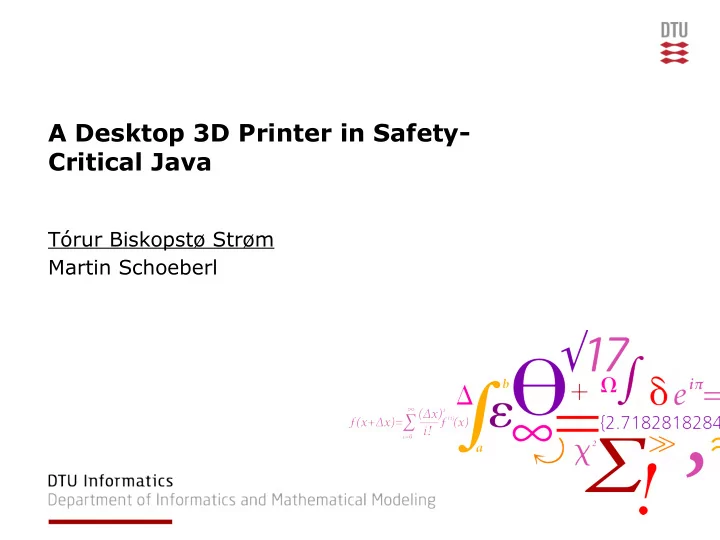

A Desktop 3D Printer in Safety- Critical Java Tórur Biskopstø Strøm Martin Schoeberl
RepRap • 3D plastic printer • Melts and extrudes plastic whilst moving in 3 dimensions • Movement and extrusion is done according to G- codes • G-codes are simple instructions generated from 3D drawings • G-codes are often sent by a host computer to a controller 2 DTU Informatics, Technical University of Denmark A Desktop 3D Printer in Safety-Critical Java 23 October 2012
Project Goals • Use a RepRap 3D desktop printer as a safety-critical use- case • Create a SCJ level 1 implementation of the printer on top of JOP • Evaluate the SCJ specification based on the use-case 3 DTU Informatics, Technical University of Denmark A Desktop 3D Printer in Safety-Critical Java 23 October 2012
RepRap as a Use-Case • Not a real safety-critical system, however it is still useful • Real-time requirements: ➢ Read temperature ➢ Maintain temperature ➢ Move stepper motors at fixed speeds ➢ Read end-stops • Too high temperature can destroy hardware 4 DTU Informatics, Technical University of Denmark A Desktop 3D Printer in Safety-Critical Java 23 October 2012
Safety-Critical Java (SCJ) • Specification based on the Real-Time Specification for Java (RTSJ) • Subset of Java (and RTSJ) • Aims to bring Java to safety-critical systems that need certification • A notable difference with Java is the absence of a garbage collector: ➢ Objects created in scopes ➢ When a scope is left all objects created within are deallocated • PeriodicEventHandlers (PEH) are periodic, Thread-like components • Level 1 allows parallel PEHs 5 DTU Informatics, Technical University of Denmark A Desktop 3D Printer in Safety-Critical Java 23 October 2012
Safety-Critical Java (SCJ) • A lack of safety-critical use-cases implemented in SCJ means a lack of evaluations: ➢ Is SCJ useful for safety-critical applications? ➢ Is the SCJ specification complete? ➢ Is SCJ accessible for Java, and other, programmers? 6 DTU Informatics, Technical University of Denmark A Desktop 3D Printer in Safety-Critical Java 23 October 2012
Java Optimized Processor (JOP) • Hardware implementation of the Java Virtual Machine • Time-predictable • VHDL source files allow porting to different FPGAs • Ports and hardware on the specific FPGA is added using SIMPCON and accessed using ”hardware” objects 7 DTU Informatics, Technical University of Denmark A Desktop 3D Printer in Safety-Critical Java 23 October 2012
Implementation – Hardware Overview • 2 hardware objects • Serial data guaranteed to be processed with 115200 baud rate 8 DTU Informatics, Technical University of Denmark A Desktop 3D Printer in Safety-Critical Java 23 October 2012
Implementation – Interface Board • Voltage level shifters • Motor drivers • Heater drivers 9 DTU Informatics, Technical University of Denmark A Desktop 3D Printer in Safety-Critical Java 23 October 2012
Implementation - FPGA 10 DTU Informatics, Technical University of Denmark A Desktop 3D Printer in Safety-Critical Java 23 October 2012
Implementation – Controller Layers 11 DTU Informatics, Technical University of Denmark A Desktop 3D Printer in Safety-Critical Java 23 October 2012
Implementation – PeriodicEventHandlers 12 DTU Informatics, Technical University of Denmark A Desktop 3D Printer in Safety-Critical Java 23 October 2012
Evaluation • PEHs are similar to Java Threads: ➢ Functionality distribution is similar ➢ Automatically scheduled ➢ Objects created during execution are automatically deallocated • The scope size of a PEH is specified when creating it: ➢ Object size is platform dependent ➢ Tool to calculate the maximum potential size of a PEH is desirable – SizeEstimator is cumbersome 13 DTU Informatics, Technical University of Denmark A Desktop 3D Printer in Safety-Critical Java 23 October 2012
Evaluation • If representing a schedulable task-set, PEHs are guaranteed to execute in the specified period • Application and platform must be WCET analysable to guarantee schedulability • WCET analysis performed on application showed following results: ➢ Unbounded loops cannot be used ➢ Busy blocks cannot be used, e.g. when reading input ➢ Library code must be modified to support this, e.g. String.substring • Schedulable task-set was possible by avoiding most library code • Does not include task switching time 14 DTU Informatics, Technical University of Denmark A Desktop 3D Printer in Safety-Critical Java 23 October 2012
Evaluation • Some programming difficulties arise in the absence of garbage collection: ➢ Objects created in a scope cannot be referenced except in the current scope or nested scopes ➢ Result generated in one PEH must be stored in higher scoped, shared objects to be accessible in another PEH ➢ Very different from normal Java where Objects are freely referenced ➢ This changes behaviour of library code, e.g. StringBuffer.toString 15 DTU Informatics, Technical University of Denmark A Desktop 3D Printer in Safety-Critical Java 23 October 2012
Evaluation SCJ firmware Teacup 79 ~32 Firmware size (KB) 500 @ 60 MHz 17570 @ 20 MHz Maximum steps per second • SCJ firmware size not optimized • SCJ Maximum steps obtained from WCET analysis – “best” worst-case performance • Performance not directly linked to SCJ specification – platform dependant • However might still indicate that SCJ is not optimal for low-level tasks such as pulsing stepper motors 16 DTU Informatics, Technical University of Denmark A Desktop 3D Printer in Safety-Critical Java 23 October 2012
Conclusion • PeriodicEventHandlers are similar to Threads • Absence of garbage collection noticeably changes programming style • Maximum PeriodicEventHandler memory consumption must be analysable • Application and platform must be WCET analysable, which also alters programming style • Slow stepping might indicate that safety-critical Java is not useful for low-level hardware controlling • Possible to implement a RepRap as a level 1 SCJ application 17 DTU Informatics, Technical University of Denmark A Desktop 3D Printer in Safety-Critical Java 23 October 2012
Demonstration and Questions
Recommend
More recommend